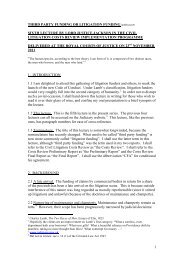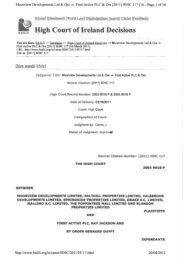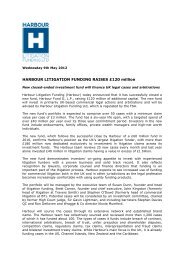Download PDF document - Harbour Litigation Funding
Download PDF document - Harbour Litigation Funding
Download PDF document - Harbour Litigation Funding
You also want an ePaper? Increase the reach of your titles
YUMPU automatically turns print PDFs into web optimized ePapers that Google loves.
Kelly, Grossman & Flanagan, LLP v Quick Cash, Inc. :: March, 2012 :: New York Ot...<br />
http://law.justia.com/cases/new-york/other-courts/2012/2012-ny-slip-op-50560-u.html<br />
Page 4 of 6<br />
15/10/2012<br />
the agreements, not providing accurate up to date status of the collateral cases and<br />
refusing to provide the settlement <strong>document</strong>s as required by the contracts.<br />
A party moving for summary judgment must make a prima facie showing of entitlement<br />
as a matter of law, offering sufficient evidence to demonstrate the absence of any<br />
material issues of fact. Winegrad v New York Univ. Med. Ctr., 64 NY2d 851, 487 NYS2d<br />
316 (1985); Zuckerman v New York, 49 NY2d 557, 427 NYS2d 595 (1980). Of course,<br />
summary judgment is a drastic remedy and should not be granted where there is any<br />
doubt as to the existence of a triable issue, Stewart Title Ins. Co. v Equitable Land<br />
Servs., 207 AD2d 880, 616 NYS2d 650 (2d Dept 1994), but once a prima facie showing<br />
has been made, the burden shifts to the party opposing the motion to produce<br />
evidentiary proof in admissible form sufficient to establish material issues of fact which<br />
require a [*5]trial of the action. Alvarez v Prospect Hosp., 68 NY2d 320, 508 NYS2d<br />
923 (1986).<br />
"[I]t is well settled that when parties set down their agreement in a clear, complete<br />
<strong>document</strong>, their writing should . . . be enforced according to its terms.'" South Rd.<br />
Assoc., LLC v International Bus. Machs. Corp., 4 NY3d 272, 277, 793 NYS2d 835<br />
(2005), quoting Vermont Teddy Bear Co. v 538 Madison Realty Co., 1 NY3d 470, 475,<br />
775 NYS2d 765 (2004). When interpreting a contract, "the court should arrive at a<br />
construction which will give fair meaning to all of the language employed by the parties<br />
to reach a practical interpretation of the expressions of the parties so that their<br />
reasonable expectation will be realized." Herzfeld v Herzfeld,50 AD3d 851, 857 NYS2d<br />
170 (2d Dept 2008). If the terms of a written contract are clear and unambiguous,<br />
intent of the parties must be found within the four corners of the contract. Correnti v<br />
Allstate Props., LLC, 38 AD3d 588, 832 NYS2d 594 (2d Dept 2007). Extrinsic evidence<br />
of the parties' intent may be considered only if the agreement is ambiguous, which is<br />
an issue of law for the courts to decide. Innophos, Inc. v Rhodia, S.A., 10 NY3d 25, 852<br />
NYS2d 820 (2008). A contract is unambiguous if the language it uses has a definite and<br />
precise meaning, unattended by the danger of misconception in the purport of the<br />
agreement itself and there is no reasonable basis of difference of opinion. Greenfield v<br />
Philles Records, Inc., 98 NY2d 562, 750 NYS2d 565 (2002).<br />
In order to constitute a transaction subject to the Penal Code § 190.40, prohibiting<br />
criminal usury, such transaction must constitute a loan. Donatelli v Siskind, 170 AD2d<br />
433, 565 NYS2d 264 (2d Dep't 1991). Usury laws do not apply to investments (GOL § 5<br />
-501[2]). Where a transaction involves interest to be paid based upon a contingency<br />
which is in the control of the debtor, usury will not apply. Summer v People, 29 NY 337<br />
(1864). In order to determine whether a particular transaction qualifies as a loan<br />
subject to a criminal usury prohibitions, courts look to the purpose of the transaction;<br />
i.e., to lend money at a usurious rate dictated by the lender. Donatelli v Siskind, 170<br />
AD2d 433, 565, NYS2d 224 (2d Dep't 1991). Thus, the purpose of a transaction is<br />
determined by its true character, under all circumstances, rather than by its title.<br />
Vjuetta v Euro-Quest Corp., 29 AD3d 895 (2d Dep't 2006).<br />
The contracts dated May 6, 2005, October 10, 2006, December 7, 2006, April 9, 2007,<br />
June 5, 2007, and September 9, 2007 provide at paragraph 4.7 or 4.8 :<br />
"Attorney represents and warrants that Attorney fully understands that the Advance<br />
made hereunder is not a recourse loan, but a non-recourse financial transaction<br />
pursuant to which Investor's funds are at full risk."<br />
The Addendum to the Agreements by and among Quick Cash, Money For Lawsuits and<br />
Casefunding and affiliated entities, Muraca & Kelly, Dennis Kelly, Esq., David Grossman,<br />
Esq., Flanagan & Associates, PLLC, Suzanne Flanagan, Esq., and Kelly Grossman &<br />
Flanagan, LLP, dated August 13, 2009, page 8, provides, in part:<br />
* * * Upon the signing of this Addendum, the Flanagan Recourse Agreement(s) shall be<br />
deemed null and void and the amounts due pursuant to those recourse agreement(s)<br />
are now incorporated in full [*6]herein as non-recourse.<br />
Defendants have demonstrated their prima facie entitlement to judgment as a matter of<br />
law by proving that the disputed contracts are non-recourse advance agreements. In<br />
support of their motion, defendants contend that none of the contracts that exist as of



![Neutral Citation Number: [2010] EWHC 941 (QB) - Harbour ...](https://img.yumpu.com/47188668/1/190x245/neutral-citation-number-2010-ewhc-941-qb-harbour-.jpg?quality=85)
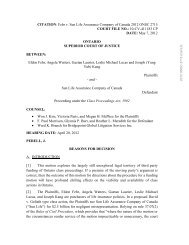
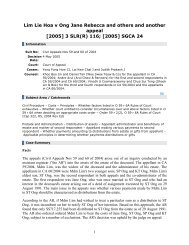
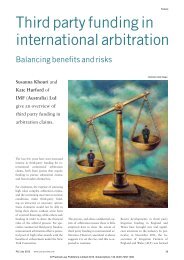
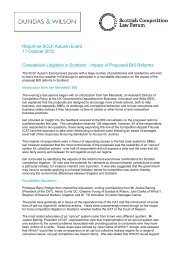
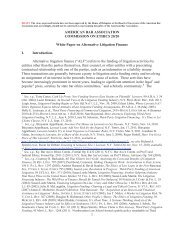
![Hall v Poolman [2009] - Harbour Litigation Funding](https://img.yumpu.com/37488843/1/190x245/hall-v-poolman-2009-harbour-litigation-funding.jpg?quality=85)
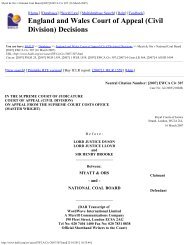

![[2013] SGHC 135 - Singapore Law Watch](https://img.yumpu.com/37488807/1/184x260/2013-sghc-135-singapore-law-watch.jpg?quality=85)
